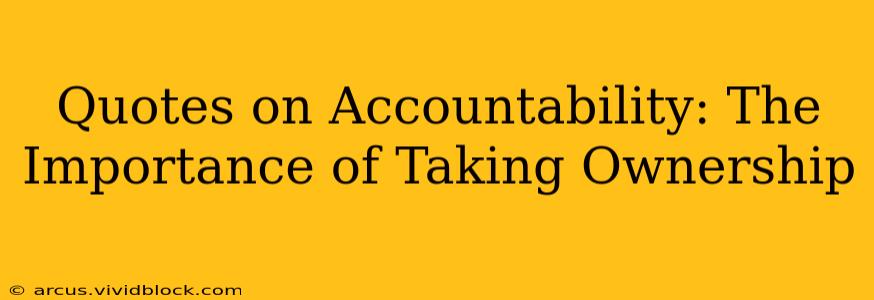Accountability. It's a word that resonates with responsibility, ownership, and the integrity to face consequences, both positive and negative. While often associated with the workplace, accountability is a cornerstone of personal growth and successful relationships, impacting every aspect of our lives. This article delves into the profound importance of taking ownership, exploring insightful quotes that illuminate its significance, and addressing frequently asked questions surrounding this crucial life skill.
What are some powerful quotes on accountability?
Many insightful thinkers and leaders have eloquently captured the essence of accountability. Here are a few powerful quotes that highlight its transformative power:
-
"The price of discipline is always less than the pain of regret." - Unknown. This quote underscores the long-term benefits of accountability. While the initial effort to be accountable might feel challenging, the pain of avoiding responsibility far outweighs it.
-
"Holding yourself accountable is the first step to personal growth." - Unknown. This concise statement emphasizes the crucial role accountability plays in self-improvement. Without taking ownership of our actions and their consequences, personal development stagnates.
-
"The only person you are destined to become is the person you decide to be." - Ralph Waldo Emerson. While not explicitly about accountability, this quote highlights the power of choice and self-determination, which are intrinsically linked to taking ownership of one's life. Accountability empowers us to make conscious choices and shape our destiny.
What is the importance of taking ownership?
Taking ownership is about acknowledging responsibility for your actions, decisions, and their outcomes. It transcends simply admitting mistakes; it's about proactively shaping your future by learning from experiences and making amends where necessary. The importance of taking ownership manifests in several key areas:
-
Building Trust: When you're accountable, you build trust with others. People know they can rely on you to follow through on your commitments and take responsibility for your actions, creating stronger, more reliable relationships, both personally and professionally.
-
Personal Growth: Accountability fosters self-awareness and encourages continuous improvement. By analyzing your actions and their impact, you identify areas needing refinement and develop strategies for personal growth.
-
Improved Performance: In professional settings, accountability directly correlates with improved performance. When individuals take ownership of their work, they are more likely to be proactive, focused, and committed to achieving results.
-
Increased Resilience: Facing challenges and accepting responsibility for mistakes builds resilience. It teaches you to learn from setbacks, adapt to change, and emerge stronger.
How do I hold myself accountable?
Holding yourself accountable requires a proactive and conscious effort. Here are some practical strategies:
-
Set Clear Goals: Defining specific, measurable, achievable, relevant, and time-bound (SMART) goals provides a framework for tracking progress and holding yourself accountable.
-
Track Your Progress: Regularly review your goals and track your progress. Use a journal, planner, or app to monitor your accomplishments and identify areas needing improvement.
-
Seek Feedback: Actively solicit feedback from trusted sources to gain objective perspectives on your performance and identify blind spots.
-
Celebrate Successes: Acknowledge and celebrate your accomplishments, no matter how small. This positive reinforcement helps maintain motivation and reinforces accountable behavior.
-
Learn from Mistakes: When you make mistakes, analyze them objectively, identify the underlying causes, and develop strategies to prevent similar errors in the future. Don't dwell on the mistake itself, but focus on learning and growth.
What are the consequences of a lack of accountability?
A lack of accountability can have significant negative consequences, impacting both personal and professional lives:
-
Damaged Relationships: A consistent failure to take ownership erodes trust and damages relationships. People become hesitant to rely on you, leading to isolation and strained connections.
-
Stagnant Growth: Without accountability, personal growth stagnates. You fail to learn from mistakes, hindering your ability to improve and reach your full potential.
-
Missed Opportunities: A lack of accountability can lead to missed opportunities, both personally and professionally. People may be less likely to entrust you with responsibilities or delegate tasks, limiting your growth and advancement.
How can accountability improve teamwork?
Accountability is a cornerstone of effective teamwork. When team members are accountable for their individual contributions and the overall team goals, it fosters:
-
Increased Collaboration: Accountability encourages collaboration by fostering a sense of shared responsibility and commitment to the team's success.
-
Enhanced Communication: Open communication is essential for accountability. Team members are more likely to communicate openly and honestly when they feel comfortable taking ownership of their actions.
-
Improved Problem-Solving: When accountability is ingrained in the team culture, problem-solving becomes more efficient and effective. Team members are more likely to proactively identify and address issues.
In conclusion, accountability is not merely a desirable trait; it's a fundamental skill essential for personal growth, professional success, and building strong, healthy relationships. By embracing ownership and actively striving for accountability, we empower ourselves to shape a more fulfilling and impactful life.

